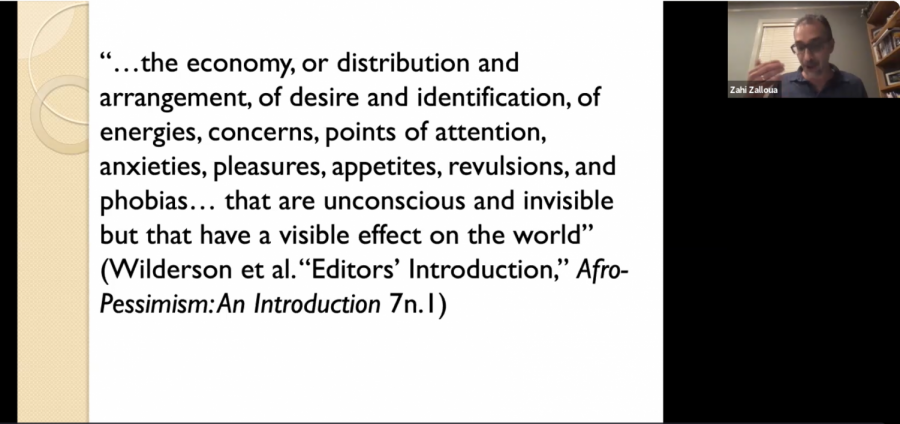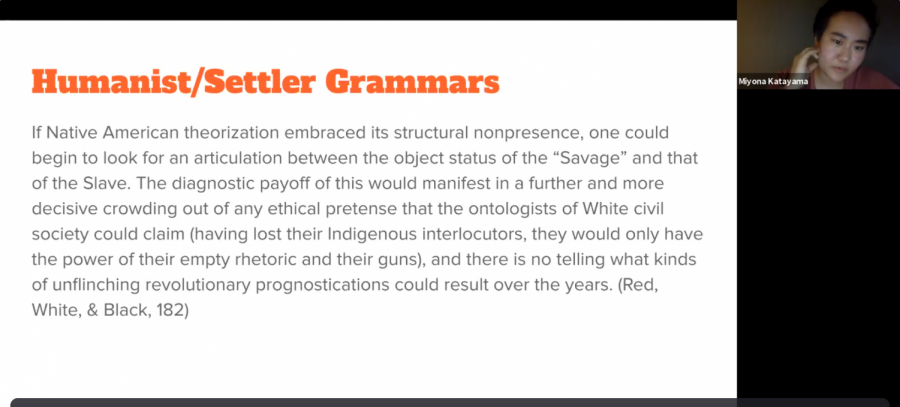Imagining racial solidarity in ‘Blackness or Indigeneity?’ Yes Please!’
November 25, 2020
On Thursday, Nov. 19, Whitman College hosted a virtual talk titled, “Blackness or Indigeneity? Yes Please!”
Part of the Adam Dublin Award for the study of global multiculturalism, the event featured the winner of the award Miyona Katayama, a senior majoring in Race and Ethnic Studies, and Professor of French, Gender Studies, and Race and Ethnic Studies Zahi Zalloua.

The event was moderated by Professor Gaurav Majumdar, an English professor. In his primer for the talk, Professor Majumdar said that the speakers, “[would] explore the possibility of a Black-Palestinian solidarity movement, and in doing so they critically engage Afro-pessimism’s deep suspicion of cross-racial coalitions, arguing for the need to think about anti-Blackness with settler colonialism and vice versa.”
In an interview before the talk, Professor Majumdar introduced the idea of Afro-pessimism, a contemporary ideology that acts as a lens of interpretation to accounts for civil society’s dependence on anti-Black violence. He also stressed the importance of the talk’s subject matter.
“This argument that Katayama and Zalloua are offering is crucial, so that people don’t recede during the global pandemic into narrower and narrower constituencies,” Gaurav said. “One of the risks of Afro-pessimism is that in seeing the hostility of others, Afro-pessimists often assume that they are not available, that their solidarity is not available…”
Professor Zalloua addressed what he believes are the potential consequences of Afro-pessimism. He views identifying the problem of anti-Blackness as successful, but expresses concerns over the implications of how the problem is framed. Although Afro-pessimism is a theoretical framework, Zalloua says there are direct consequences of its tenets that he resists, especially in regards to efforts for global solidarity.
“[Within Afro-pessimism] the temptation for cross racial coalitions must be resisted, because sooner or later the non-Black people of color will betray Blacks once their interests are met by the white elites… [As a result] cross racial solidarity is at best precarious and short lived, and at worst instrumental and ripe for betrayal,” Zalloua said.
Aside from addressing the harms of rejecting solidarity from an Afro-pessimist perspective, the talk also expanded on how Indigenous activism can move forward with a mind for solidarity.

Katayama emphasized that movements for land re-appropriation and establishment of new native sovereignties necessarily represents the undoing of settler colonialism that ignores anti-Blackness.
“Indigenous Studies doesn’t have return to a pre-colonial past but to a future that must engage with capitalist political economy and anti-Blackness as well.”
Katayama believes that the key to fighting anti-Blackness and moving forward from the institutionalized oppression of Black people lies in what not to do. An important first step is to reframe discussions of anti-Blackness: “Meaningful reparations must be formatted not as a liberal reform or a Black anger management strategy, in which slavery is a historical wrong that can be righted within the status quo, but instead as a radical crisis in American institutions and logic of the human. Real reparations would mean a transformation of the social order.”
Although the talk focused on barriers to the work of solidarity, many of its challenges have already been overcome. Along with radical changes to people’s lives from the COVID-19 pandemic, the system has been shaken significantly, and alternative approaches for connection have had to be explored. For Professor Majumdar, this signals that the pandemic not only brings challenges to global solidarity efforts but also represents a unique possibility for positive change.
“The kinds of unimagined or unthought opportunities that the pandemics have forced people to devise is an area that needs further exploration,” Majumdar said. “We couldn’t usually think of large, massive academic conferences taking place in digital format, but now that it’s been done, people are not so averse to the idea.”
There is much work that needs to be done, and it will not be easy.
“The project of cross-racial solidarity must overcome many problems with how each position can understand each other,” Zalloua said. “Afro-pessimism is a cutting-edge movement within critical Black studies that must be taken very seriously. At the same time, it excludes other struggles in a way that I think is unfair. Indigenous peoples struggle, and Palestinians struggle. If they don’t foreground anti-Blackness, then they’ll lose something from their vision of racial justice.”





